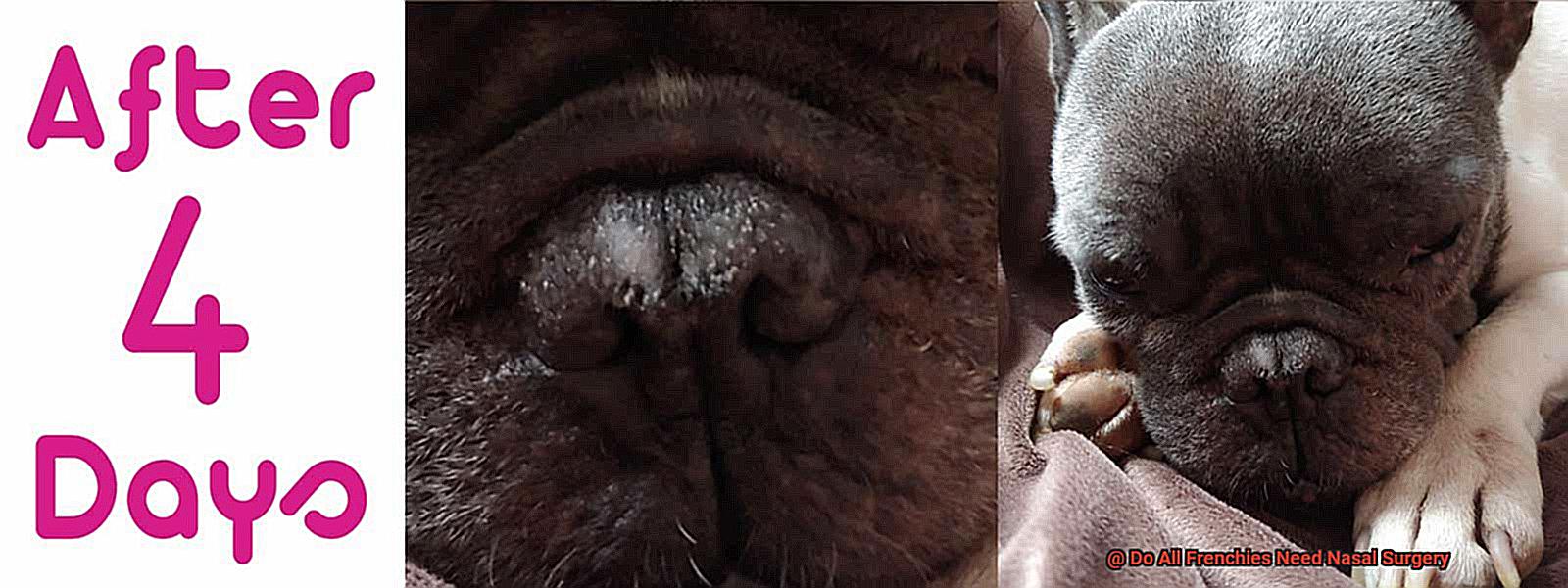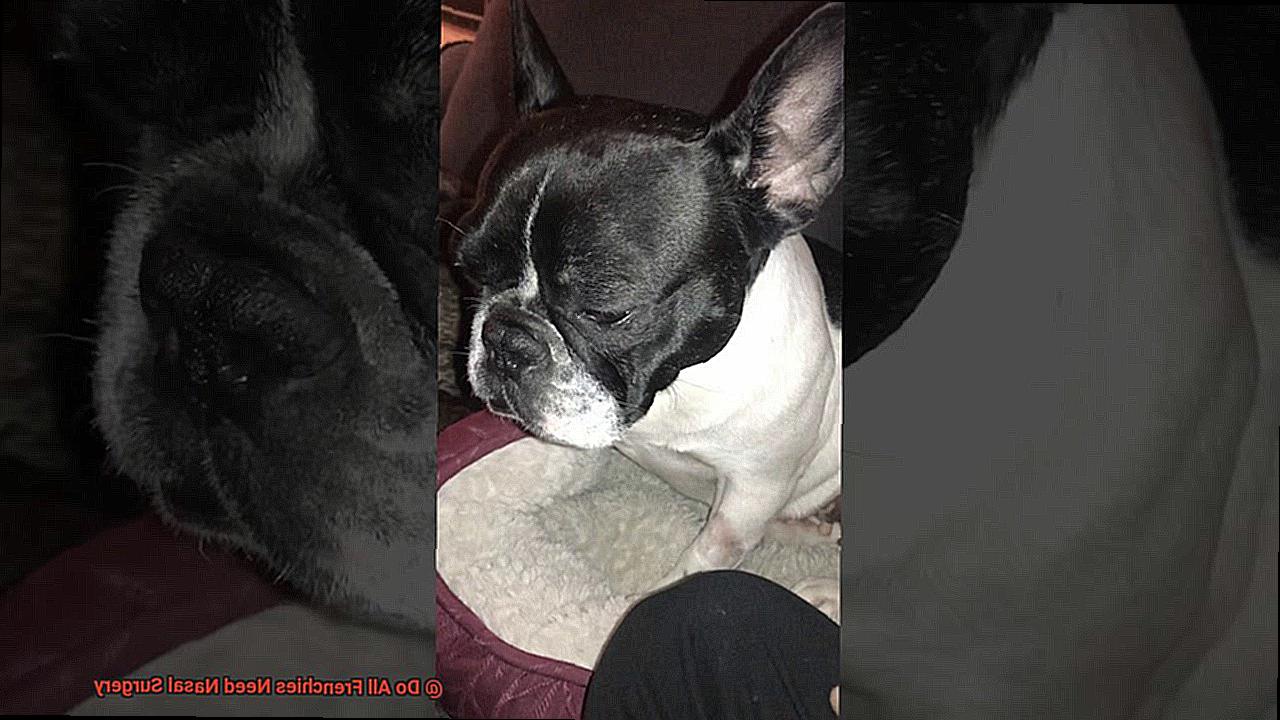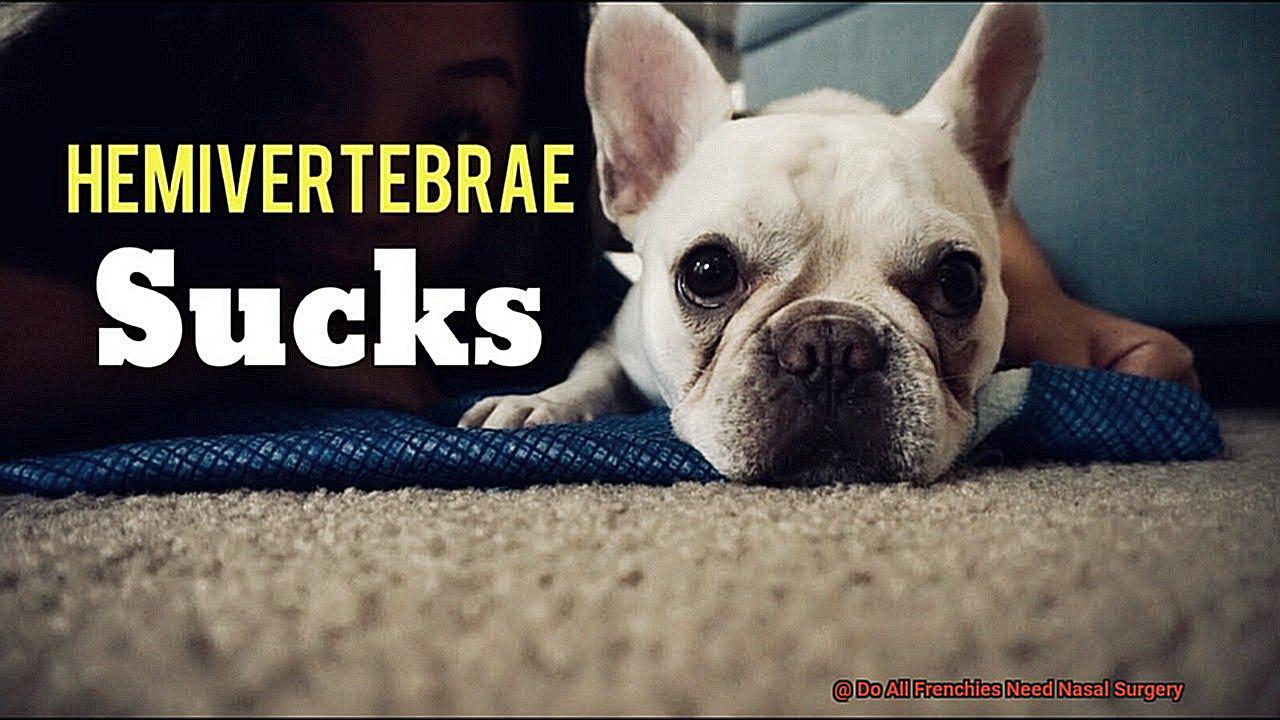Do All Frenchies Need Nasal Surgery?
You’ve fallen head over heels for these adorable pups and can’t get enough of their squishy faces. But here’s the million-dollar question: do all Frenchies really need nasal surgery?
Well, fear not, because we’re about to embark on a nose-expanding journey to find out the truth. We’ll dig deep into the factors that determine whether your Frenchie needs a little nasal TLC or if they can rock their snub-nosed look without any worries.
So, grab your magnifying glass, channel your inner Sherlock Holmes, and let’s uncover the mystery behind Frenchies and nasal surgery.
Do All Frenchies Need Nasal Surgery?
Contents
- 1 Do All Frenchies Need Nasal Surgery?
- 2 The Severity of Respiratory Issues in French Bulldogs
- 3 Conservative Management for Mild Cases of Brachycephalic Airway Syndrome
- 4 Nares Resection: Widening the Nostrils for Improved Airflow
- 5 Soft Palate Resection and Tracheostomy: Alternative Surgical Options for Severe Cases
- 6 Assessing Each Dog’s Specific Needs to Determine the Best Course of Action
- 7 Surgery as a Relief, But Not a Cure-All Solution
- 8 The Importance of Proper Management and Regular Veterinary Check-Ups
- 9 Conclusion
If you’re a proud French Bulldog owner, you may have heard about the potential need for nasal surgery in this beloved breed. French Bulldogs are known for their adorable squished faces, but this unique facial structure can sometimes lead to respiratory issues. In this article, we’ll dive into the world of brachycephalic airway syndrome (BAS) and explore whether all Frenchies need nasal surgery.
Understanding Brachycephalic Airway Syndrome (BAS):
Brachycephalic airway syndrome is a combination of anatomical abnormalities that restrict airflow in the nasal passages, throat, and windpipe. These abnormalities include narrowed nostrils, elongated soft palate, and a collapsed trachea. While this condition is commonly seen in French Bulldogs and other brachycephalic breeds, it’s important to note that not all dogs with BAS will require nasal surgery.
Factors to Consider:
The decision to proceed with nasal surgery should be based on several factors, including:
- Severity of the condition: Mild cases of BAS may only require conservative management strategies such as weight management, exercise restriction, and environmental adjustments. However, more severe cases may necessitate surgical intervention.
- Impact on quality of life: If your Frenchie is experiencing symptoms like noisy breathing, snoring, snorting, excessive panting, or difficulty exercising or playing for extended periods, it’s crucial to assess whether these issues significantly impact their overall well-being.
- Veterinarian evaluation: Working closely with a qualified veterinarian who specializes in brachycephalic breeds is essential. They will assess your Frenchie’s individual case and guide you on the best course of action.
Non-Surgical Options:
Before considering nasal surgery, it’s important to explore non-surgical options to manage BAS. These may include:
- Weight management: Maintaining a healthy weight can reduce the strain on the respiratory system.
- Environmental adjustments: Avoiding triggers that worsen symptoms, such as heat or excessive exercise, can help alleviate breathing difficulties.
- Humidifiers and air purifiers: These devices can improve air quality and reduce respiratory irritation.
- Medications: Your veterinarian may prescribe medications to reduce inflammation or open up the airways.

Nasal Surgery for French Bulldogs:
If nasal surgery is deemed necessary, it is typically aimed at widening the nasal passages to improve airflow. Procedures such as turbinate reduction or widening of the nostrils may be performed. It’s crucial to choose a veterinarian with experience in brachycephalic breeds to ensure the best possible outcome.
The Severity of Respiratory Issues in French Bulldogs
Today, we’re diving deep into the world of respiratory issues in our beloved Frenchie friends. These squish-faced cuties are known for their unique physical characteristics, but unfortunately, these features can sometimes lead to breathing difficulties. Let’s explore the severity of these respiratory issues and how they can vary from mild to severe.
Brachycephalic Airway Syndrome (BAS):
French Bulldogs, along with other brachycephalic breeds, have a shortened skull and pushed-in nose. This adorable look can cause a range of respiratory problems, with BAS being one of the most common. BAS includes several abnormalities in the upper airway, such as elongated soft palate, narrowed nostrils (stenotic nares), everted laryngeal saccules, and even a hypoplastic trachea.
Symptoms of Respiratory Distress:
Just like humans, French Bulldogs with respiratory issues may experience symptoms like snoring, wheezing, snorting, and difficulty breathing. The severity of these symptoms can vary depending on the specific abnormalities present and the degree of airway obstruction.
The Spectrum of Severity:
Not all French Bulldogs with respiratory issues require surgical intervention. Some may only have mild symptoms that can be managed through non-surgical options like weight management, environmental adjustments, and medication. However, for those experiencing more severe respiratory distress, surgical correction may be necessary to improve their quality of life and prevent further complications.
Staying Alert: Recognizing Respiratory Distress Signs:
As responsible Frenchie parents, it’s vital to be aware of the signs of respiratory distress in our furry friends. If you notice your French Bulldog exhibiting concerning symptoms like excessive panting, gasping for breath, or collapsing episodes, it’s crucial to seek immediate veterinary attention.
Regular Check-ups and Monitoring:
Regular check-ups with a veterinarian are essential for monitoring the respiratory health of French Bulldogs. These visits help determine if surgical intervention is necessary and ensure that any potential issues are caught early on.
Conservative Management for Mild Cases of Brachycephalic Airway Syndrome
Brachycephalic Airway Syndrome (BAS) is a common condition that affects our beloved French Bulldogs. The unique physical characteristics of these squish-faced canines often lead to breathing difficulties. While surgery is sometimes necessary, many mild cases of BAS can be effectively managed through conservative measures. In this article, we will explore the key components of conservative management for mild cases of BAS in French Bulldogs, helping your furry friend breathe easy and live a comfortable life.
Weight Management:
Maintaining a healthy weight is crucial for French Bulldogs with BAS. Obesity can exacerbate breathing difficulties by putting additional pressure on the airways. Ensure your Frenchie follows a balanced diet and gets regular exercise to keep their weight in check.
Environmental Modification:
Creating a cool and well-ventilated living environment is essential for dogs with BAS. Extreme temperatures can worsen respiratory distress, so avoid exposing your Frenchie to hot or humid conditions. Ensure adequate air circulation in their living spaces.
Exercise Restriction:
While exercise is important for overall health, excessive physical exertion can strain the already compromised airways of brachycephalic breeds. Opt for shorter, low-intensity walks rather than strenuous activities to minimize breathing difficulties.
Proper Grooming:
Regular grooming practices are vital for minimizing the risk of respiratory complications in French Bulldogs. Pay extra attention to cleaning their skin folds and facial wrinkles to prevent the accumulation of dirt and moisture, which can exacerbate breathing difficulties and lead to skin infections.
Regular Monitoring:
Keep a close eye on your Frenchie’s respiratory health and be vigilant for any signs of distress or worsening symptoms. Regular veterinary check-ups are essential for assessing the progress of the condition and making necessary adjustments to the management plan.
Nares Resection: Widening the Nostrils for Improved Airflow
Let’s dive into the world of nares resection and find out if it’s a necessary procedure for every French Bulldog.
What is Nares Resection?

Nares resection, also known as nostril widening surgery, is a common procedure performed on French Bulldogs to improve their airflow and breathing. This surgery involves removing a small wedge of tissue from the nostrils to widen them, allowing for better air passage and easier breathing.
Why do French Bulldogs Need Nares Resection?
French Bulldogs are a brachycephalic breed, which means they have a shortened skull and a compressed nasal passage. This anatomical feature can lead to breathing difficulties and respiratory issues. Nares resection is often recommended for French Bulldogs with severe breathing problems.
Is Nares Resection Necessary for Every French Bulldog?
Not every French Bulldog requires nares resection. Some dogs may have mild breathing issues that can be managed without surgery through lifestyle changes and medical interventions. It’s important to consult with a veterinarian experienced in brachycephalic surgery to determine if your Frenchie would benefit from the procedure.
The Benefits of Nares Resection
For French Bulldogs with severe breathing problems, nares resection can be life-changing. The surgery improves their quality of life by allowing them to breathe more easily and comfortably. Most dogs experience immediate improvement in their breathing after the procedure.
Post-Surgery Care
After nares resection, it’s essential to provide proper post-surgery care for your Frenchie. This includes keeping them calm and comfortable, monitoring for any signs of complications or infection, and following the veterinarian’s instructions for pain management and wound care.
Other Procedures for Severe Cases
While nares resection can significantly improve breathing in French Bulldogs, it may not completely eliminate all respiratory issues. In more severe cases, additional procedures such as soft palate resection or laryngeal saccule excision may be necessary.
Consult with a Veterinarian
To determine if your French Bulldog needs nares resection or any other surgical interventions, it’s crucial to consult with a veterinarian experienced in brachycephalic surgery. They will evaluate your Frenchie’s breathing difficulties and recommend the most appropriate treatment options.
Conclusion
Soft Palate Resection and Tracheostomy: Alternative Surgical Options for Severe Cases
It’s true. Luckily, there are surgical options available to help alleviate these issues and improve their quality of life. In this blog post, we’ll explore two alternative surgical options for severe cases of breathing difficulties in French Bulldogs: soft palate resection and tracheostomy.
Soft Palate Resection: Clearing the Pathway
Picture this – you’re enjoying a leisurely stroll with your Frenchie when suddenly, they start to struggle for breath. It’s a scary situation, but fear not. Soft palate resection could be the answer. This surgery involves removing excess tissues from the soft palate, which can obstruct the airway and make breathing difficult. By trimming away this excess tissue, we create a wider opening at the back of the throat, allowing for better airflow.
Tracheostomy: An Alternate Route
Sometimes, breathing difficulties in French Bulldogs can be so severe that soft palate resection alone is not enough. Enter tracheostomy – a more invasive procedure that creates an opening in the windpipe through a small incision in the neck. A tube is then inserted into this opening, providing an alternate route for breathing. Tracheostomy is often reserved for cases where other surgical options have failed or when there is a significant obstruction in the upper airway.
Combining Forces: When Both Procedures Are Needed
In some cases, French Bulldogs may require both soft palate resection and tracheostomy to effectively manage their breathing difficulties. This decision is made by a skilled veterinarian after careful evaluation of the severity of the condition and the dog’s overall health. While it may seem daunting, combining these procedures can provide significant relief and improve your Frenchie’s quality of life.
Post-Surgical Care: The Road to Recovery
After any surgery, proper post-operative care is crucial. Your veterinarian will provide specific instructions on pain management, feeding, and monitoring for complications. Regular follow-up visits are essential to assess your Frenchie’s progress and make any necessary adjustments to the treatment plan.
Conclusion: Exploring Options for a Happier, Healthier Frenchie
Remember, soft palate resection and tracheostomy are not routine procedures for all French Bulldogs with breathing difficulties. They are considered as last resort options when other treatments have failed or when there is a risk to the dog’s well-being. Non-invasive options should always be explored first. Each Frenchie is unique, and a qualified veterinarian should evaluate their individual needs.
Assessing Each Dog’s Specific Needs to Determine the Best Course of Action
French Bulldogs, those adorable little snort machines, are known for their unique facial structure and, unfortunately, their propensity for breathing difficulties. If you’re a proud owner of one of these lovable pups, you may find yourself wondering if nasal surgery is the right course of action to improve their quality of life. Well, fear not. We’re here to help you assess your Frenchie’s specific needs and determine if it’s time to take the plunge into the world of nasal surgery.
Snorting Like a Pro: Assessing Breathing Difficulties
First things first, let’s take a closer look at your Frenchie’s breathing difficulties. Are they just snorting a bit here and there, or are they gasping for air like a fish out of water? The severity of their breathing issues is a key factor in determining if surgery is necessary. Mild respiratory problems can often be managed through lifestyle changes, medication, or even some paw-tastic exercises. But if your Frenchie is struggling to catch their breath on a regular basis, nasal surgery may be the answer.
Unmasking the Root Cause: Underlying Factors
Next up, let’s uncover the root cause of your Frenchie’s breathing woes. French Bulldogs are no strangers to brachycephalic airway syndrome, which can be a real pain in the snout. However, not all Frenchies with this syndrome require surgical intervention. Some may have milder forms that can be managed without going under the knife. So, it’s essential to dig deeper and understand the specific factors contributing to your Frenchie’s breathing difficulties before making any surgical decisions.
Age Ain’t Just a Number: Considering Your Frenchie’s Life Stage
Age is just a number, they say. But when it comes to assessing your Frenchie’s need for nasal surgery, it plays a significant role. Younger pups may have more room for improvement and respond well to non-surgical interventions. On the flip side, older Frenchies with more severe respiratory issues may benefit greatly from surgical correction. So, take a moment to consider your pup’s age and how it may impact their response to treatment options.
Beware the Domino Effect: Secondary Health Problems
Breathing difficulties in French Bulldogs can lead to a whole range of secondary health problems. From heat intolerance to exercise intolerance, these issues can really throw a wrench in your Frenchie’s happy-go-lucky lifestyle. If these secondary problems are significantly affecting your pup’s overall well-being, nasal surgery may be necessary to knock them out of the park and restore their zest for life.
Surgery as a Relief, But Not a Cure-All Solution
You’ve got a French Bulldog with breathing difficulties, and you’re considering nasal surgery to help alleviate their symptoms. While nasal surgery can indeed provide relief and improve the quality of life for some Frenchies, it’s important to understand that it’s not a guaranteed cure-all solution for all health issues. Let’s dive into why that is.
- Case-by-case basis: Each Frenchie is unique, and their breathing difficulties can vary in severity. The decision to undergo nasal surgery should be made on a case-by-case basis, taking into account the individual dog’s symptoms and the potential risks and benefits of the procedure.
- Non-surgical interventions: Not all French Bulldogs with breathing difficulties require surgery. In some cases, mild breathing problems can be managed through non-surgical interventions such as weight management, exercise regulation, and environmental modifications. So before jumping into surgery, it’s worth exploring these alternatives.
- Underlying health issues: Breathing difficulties in French Bulldogs may not always be solely due to their brachycephalic anatomy. Other underlying health issues, such as allergies or respiratory infections, can contribute to their breathing difficulties. It’s important to consult with a veterinarian who specializes in brachycephalic breeds to identify and address any additional health concerns.
- Risks and complications: Like any surgical procedure, nasal surgery comes with its own set of risks and potential complications. It’s essential to understand these risks and be prepared for post-operative care requirements before proceeding with the surgery.
- Limited scope: Nasal surgery primarily focuses on improving breathing by addressing the narrowed airways in French Bulldogs. However, it does not address other potential health issues associated with brachycephalic breeds, such as eye problems or skin fold infections.
The Importance of Proper Management and Regular Veterinary Check-Ups
We all know that our adorable little bat-eared buddies bring so much joy and love into our lives. But did you know that proper management and regular veterinary check-ups are essential for their health and well-being? In this pawsome blog post, I’ll share why these two things are crucial for ensuring your Frenchie stays happy and healthy.
Proper Management: The Breath of Fresh Air for Frenchies
French Bulldogs are known for their unique brachycephalic features, with their cute squishy faces and shortened snouts. While these traits make them extra lovable, they can also lead to respiratory issues. To keep your Frenchie breathing easy:
- Maintain a healthy weight: Just like us hoomans, Frenchies can suffer from obesity, which worsens their breathing difficulties. Talk to your vet about a balanced diet and exercise routine tailored for your furry friend.
- Fresh air is a must: French Bulldogs are sensitive to heat and humidity, which can make it harder for them to breathe. Ensure they have access to well-ventilated areas and keep them away from extreme weather conditions.
Regular Veterinary Check-Ups: The Rx for a Happy Frenchie
Brachycephalic breeds like French Bulldogs require extra attention when it comes to their respiratory health. Regular check-ups with a veterinarian who specializes in brachycephalic breed health are essential for:
- Monitoring respiratory function: During check-ups, vets can evaluate your Frenchie’s breathing patterns and identify any potential issues or concerns.
- Early intervention: By catching problems early on, veterinarians can provide appropriate treatment or interventions to prevent further complications.
- Additional diagnostic tests: In some cases, X-rays or airway endoscopy may be recommended to get a clearer picture of your Frenchie’s respiratory health.
Nasal Surgery: A Breath of Fresh Air for Some Frenchies
While not all French Bulldogs will require nasal surgery, it can be a lifesaver for those with severe breathing difficulties. Keep in mind:
- Individualized decision-making: The decision to proceed with surgery should be made in consultation with a veterinarian experienced in brachycephalic breed health. They will assess your Frenchie’s symptoms and risks before recommending surgery.
- Post-operative care: After surgery, it’s crucial to follow your vet’s guidelines for post-operative care. This may include medication, restricted activities, and regular follow-up visits to ensure a smooth recovery.
Conclusion
In conclusion, it is not accurate to claim that all Frenchies require nasal surgery.
While brachycephalic breeds like French Bulldogs are prone to certain respiratory issues due to their unique anatomy, not every Frenchie will necessarily need surgical intervention. It is essential to recognize that each dog is an individual with varying degrees of nasal obstruction, and some may have mild symptoms that can be managed through non-surgical means such as lifestyle adjustments, weight management, and medical treatments.
Therefore, it is crucial to consult with a veterinarian who specializes in brachycephalic breeds to assess the specific needs of your Frenchie and determine the most appropriate course of action.




